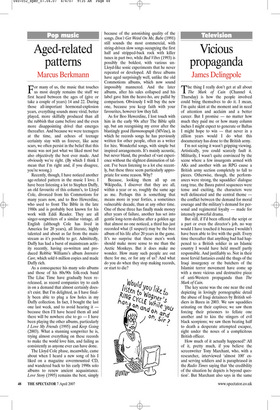Aged-related patterns
Marcus Berkmann
For many of us, the music that touches us most deeply remains the stuff we first heard between the ages of (give or take a couple of years) 14 and 22. During those all-important hormonal-explosion years, everything sounds more vivid, better played, more skilfully produced than all the rubbish that came before and the even more disappointing drivel that emerges thereafter. And because we were teenagers at the time, and echoes of teenage certainty stay with us forever, like acne scars, we often persist in the belief that this music was not just what we liked most but also objectively the best ever made. And obviously we’re right. (By which I think I mean that I’m right and, if you disagree, you’re wrong.) Recently, though, I have noticed another age-related pattern in the music I love. I have been listening a lot to Stephen Duffy, an old favourite of this column’s, to Lloyd Cole, divorced from his Commotions for many years now, and to Boo Hewerdine, who used to front The Bible in the late 1980s and is probably best known for his work with Eddi Reader. They are all singer-songwriters of a similar vintage, all English (although Cole has lived in America for 20 years), all literate, highly talented and about as far from the mainstream as it’s possible to get. Admittedly, Duffy has had a burst of mainstream activity recently, having co-written and produced Robbie Williams’s album Intensive Care, which sold 6 million copies and made Duffy rich.
As a consequence his many solo albums and those of his 80s/90s folk-rock band The Lilac Time have gradually been rereleased, as record companies try to cash in on a demand that almost certainly doesn’t exist. But I’m delighted, as I have finally been able to plug a few holes in my Duffy collection. In fact, I bought the last one last week, and to avoid hearing it because then I’ll have heard them all and there will be nowhere else to go — I have been playing the other albums, particularly I Love My Friends (1995) and Keep Going (2003). What a stunning songwriter he is, trying almost everything on these records to make the world love him, and failing as consistently as anyone ever can have done.
The Lloyd Cole phase, meanwhile, came about when I heard a new song of his I liked on a magazine covermounted CD, and wandered back to his early 1990s solo albums to renew ancient acquaintance. Love Story (1995) remains the best, simply because of the astonishing quality of the songs. Don’t Get Weird On Me, Babe (1991) still sounds the most commercial, with string-driven slow songs occupying the first half and stripped-back rock with killer tunes in part two, while Bad Vibes (1993) is possibly the boldest, with various unLloyd-like sonic experiments that he never repeated or developed. All three albums have aged surprisingly well, unlike the old Commotions albums, which now sound impossibly mannered. And the later albums, after his sales collapsed and his label gave him the heave-ho, are pallid by comparison. Obviously I will buy the new one, because you keep faith with your favourites, however low they fall.
As for Boo Hewerdine, I lost touch with him in the early 90s after The Bible split up, but am recognising my error after the blastingly good Harmonograph (MVine), in which he records songs he has previously written for other people, often as a writer for hire. Wonderful songs, with simple but inspired arrangements. It’s mainly acoustic, but never bland, the product of vast experience without the slightest diminution of talent. I’ve been listening to a lot else recently, but these three seem particularly appropriate for some reason. Why?
Because, looking them all up on Wikipedia, I discover that they are all, within a year or so, roughly the same age as me. Perhaps this is something that means more in your forties, a sometimes vulnerable decade, than at any other time. One of these three has finally made money after years of failure, another has set into gentle long-term decline after a golden age that almost no one noticed, a third has just recorded what (I suspect) may be the best album of his life after 20 years in the game. It’s no surprise that these men’s work should make more sense to me than the Arctic Monkeys. But it does make me wonder. How many such people are out there for me, or for any of us? And what do you do when they stop making records, or start to die?


































































 Previous page
Previous page